Idil Burale is a new contributor to Spacing and recently ran in ward 1 for city councillor
On October 27th, Torontonians – much to the disappointment of the late night comics – narrowly elected John Tory as the city’s next mayor. Now that the city has rid itself of its embarrassing, scandal-plagued mayor, some observers were quick to hail the post-Ford era in Toronto — an era that promised to be boring in personality, but effective in city building.
But don’t for a second think that Ford Nation will just slither away into oblivion. Ford Nation is bigger than the man. It is a political movement rooted in neglect. Therefore, in order to defeat Ford Nation at the polls, we need to first talk about Ford Nation the idea, what it means and why it will remain relevant even with John Tory as mayor.
I’ve spent the last seven months canvassing in the heart of Ford Nation (Ward 1) and this is what I learned after knocking on thousands of doors:
As the demographic data shows, people who voted for Doug Ford are overwhelmingly marginalized. They tend to live in parts of this city where the income divide is most evident. As a result of living in designated ‘priority neighbourhoods,’ they experience disparity in terms of access to quality city services.
But they may be the most alienated from the progressive ideals of `togetherness,’ opting instead for the conservative notion of “self-reliance.”
Many of the people I met are working poor. They would rather vote for the candidate promising to lower their taxes (i.e. allowing them to keep more of their money) rather than the challenger who would increase taxes in order to strengthen the social safety net that would catch them should they lose their job.
They are conservative immigrant parents who voted for Ford solely as a defense against the “gay agenda.” Many are union members, like the guy who once argued to one my canvassers (after finding out I was endorsed by the Toronto/York Labour Council) that the last thing City Hall needed was “another f*cking activist”.
Ford Nation often includes tenants living in aging buildings who blame the crumbling infrastructure and the poor living conditions on their neighbours rather than the neglect of the absentee property owners to do upkeeps.
In short, the people who voted for Ford are as diverse as the city itself. Some are middle class voters feeling the squeeze. Most are low-income, blue-collar taxpayers who can’t seem to catch a break and are resentful at the idea of paying into a tax system that doesn’t seem to benefit them personally.
Is Ford Nation relevant only in the inner suburbs?
One reason: the lack of development since amalgamation. The dismal investment in infrastructure renewal confirms the feelings of second-class citizenry that most suburbanites hold. As they look around their city, and GTHA region, they see the construction boom that seems to be bringing prosperity and jobs to either the downtown or the 905, while they deal with two-tiered access to municipal services.
Love him or hate him, Rob Ford’s political brilliance was his ability to tap and give relevance to a deeply embedded sense of exclusion in the inner suburbs. He urged the residents of Etobicoke and Scarborough to direct their grievances to City Hall.
Despite the fact that he was Ward 2’s councillor for most of post-amalgamation period, Ford distinguished himself from the left-wing councillors who, he said, never met a tax hike they didn’t like. To suburbanites, he was an anti-establishment crusader against wasteful spending.
The irony is that the incumbents who relied on Ford’s rhetoric to rally the troops, are responsible for not advocating on behalf of their constituents to fight for their fair share of development investment. So for Ford Nation, the promise of lower taxes felt legitimate to a voter base that felt shortchanged. Low-income people who backed the Fords felt they weren’t voting against their own interests. Rather, they voted to keep more of their hard earned money in the short run even if that agenda will hurt their communities in the long term.
Ultimately, Rob Ford’s crass rhetoric and Ford Nation’s rise to political significance revealed a deep division within this city that cannot be whitewashed with Tory’s “One City” rhetoric. The Fords gave Toronto an opportunity to better engage the disenfranchised communities spread across the amalgamated city.
I wonder if the heightened interest in municipal issues sparked by the Fords could serve as a platform for this city, a wake-up call to the reality that there are large parts of Etobicoke, North York and Scarborough that have been neglected. Maybe then, something can be done to confront the divisions.
Analysis of 2014 voting patterns by Zack Taylor
Zack Taylor, an assistant professor in the City Studies program at University of Toronto Scarborough, has spent the three weeks since the election mapping Toronto’s electoral geography. Check out the results. Residents can see how their own neighbourhoods voted by looking at the poll-by-poll results for the final map. Here is his analysis of the outcome:
ABOVE MAP: Overall voting — Tory received 40%, Ford 36%, and Chow 24% support on election day. The geographical division is striking. Tory did best in the higher-income Yonge Street corridor, south of Kingston road in Scarborough, downtown condoland, and Swansea and central Etobicoke. Chow captured the gentrifying flanks of the old City of Toronto, while Ford held the postwar suburban extremities of Etobicoke, North York, and Scarborough.
ABOVE MAP: Priority Neighbourhoods — Between 2005 and 2014, the City provided targetted programming in 13 low-income Priority Neighbourhoods located in the middle and outer suburbs. Like the neighbourhoods that surround them, they tilted toward Doug Ford: 56% for Ford, 27% for Tory, and 18% for Chow.
ABOVE MAP: Neighbourhood Improvement Areas (new designation) — In March 2014, the City designated 31 low-income Neighbourhood Improvement Areas as in need of special support and programming. Most are located in suburban Etobicoke and Scarborough. Altogether, voters in these areas supported Chow more than the rest of the City (29%), and Tory less (34%). Support for Ford was about the same (37%). Ultimately, it seems that location may matter more than socio-economic disadvantage. Like their surrounding neighbourhoods, core-area polls tilted to Chow, while suburban ones tilted to Ford and Tory.
ABOVE MAP: Toronto Community Housing — The Fords have made much of their support for residents of Toronto Community Housing, whose properties are located throughout the city, and many are located in Neighbourhood Improvement Areas. All in all, voting subdivisions containing TCHC properties were more likely to Chow (29%) and less likely to support Tory (34%), and voted for Ford in similar proportion to the city as a whole (37%).
maps and captions by Zack Taylor: Visit his web site www.bigcitypolitics.ca

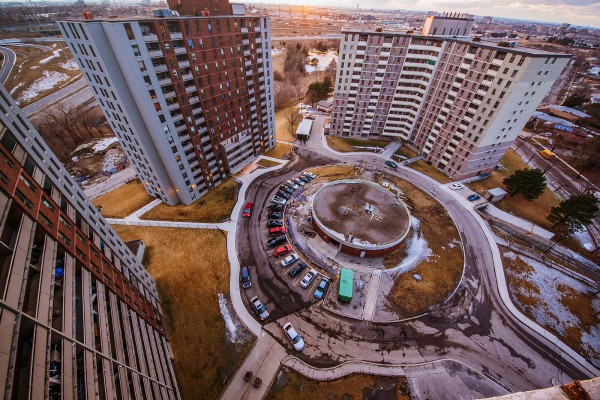
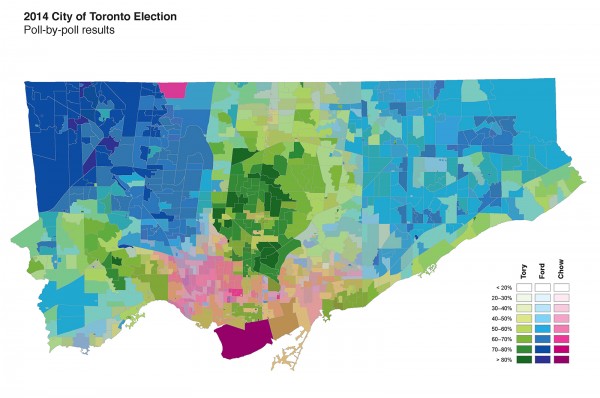
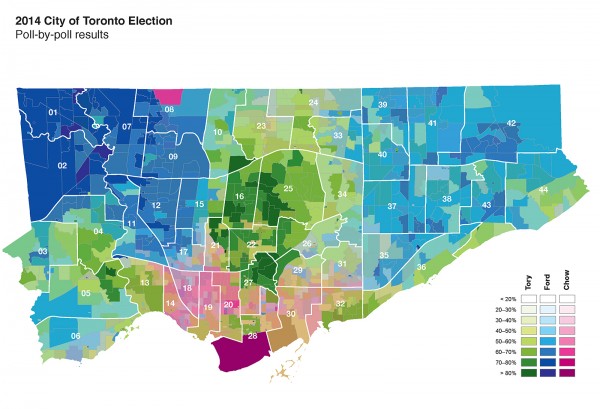
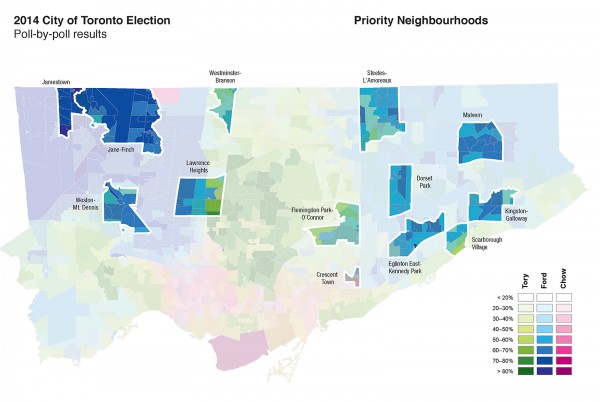
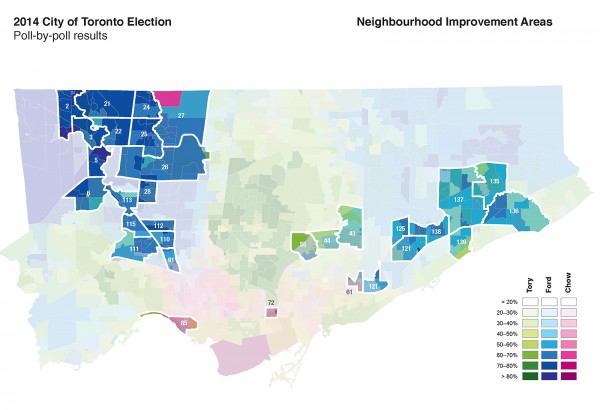
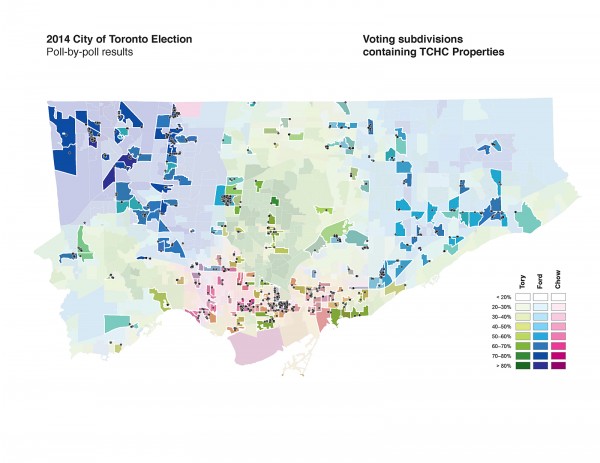
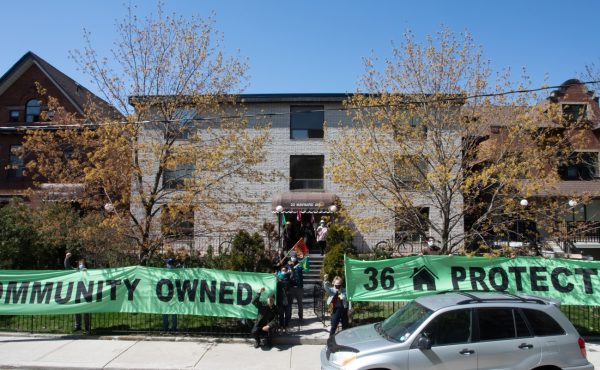
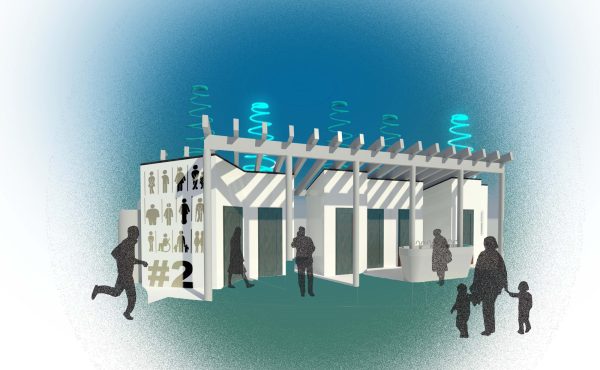

20 comments
Two things come to mind:
– When anger and frustration are more important to you than educating yourself, you are simply a landing pad for the next “pope of promise” who will tell you whatever it takes to gain power and screw you over with a smile as the Fords have done.
– I feel absolutely no sympathy for people who will believe whatever they are told even when public record contradicts everything the Fords were telling them.
Here is an interactive map of the election results with some census data integrated, inspired by Zack Taylors work: http://petesmaluck.com/torontoElection/
Excellent analysis. If I may I’d like to offer one simple solution. De-amalgamate. Go back to the boundaries that existed before the damaging Mike Harris conservative years (the last 4 of which Doug Ford Sr was an MPP) and then let the people of Etobicoke, Scarborough, York, etc elect their own civic governments that can look after their own special needs.
NOTE: Edited version of previous comment. pls delete original. tnks
The best thing for the marginalized is to call them that and stop using the phrase “Ford Nation”. Its not about Ford who did almost zero to help these folks.
What do you make of the new Child Poverty in Toronto study that just came out? http://nowtoronto.com/news/child-poverty-on-the-rise/
When I examined the map, I noticed there are numerous downtown neighbourhoods that have between 40-65% poverty rates! HIGHER than the vast majority of the rest of Toronto, inner suburbs included. Be interesting to see if we can keep the focus on alleviating poverty in all areas of the city. Narrative of lowest-income- people-are-in suburbs doesn’t hold.
There will always be a market for divisive politicians who pit us vs them. It is much easier to build wall and lay blame then roll up sleeves and work together to solve our common problems.
Both sides were to blame this election.
Harvey – you can fix local representation and gov’t, but why would you want to deamalgamate? It dumps the poorest parts of the city, disconnecting it from the richest. Better together, to borrow a phrase.
Harvey,
1) Most services provided by city hall were provided by the Metro layer of government, which incorporated all the former municipalities. This is a problem that will still be there if you went status quo ante-amalgum. (I think fire departments, zoning, garbage, libraries and parks were the items run by the local city halls. The big ticket budget items (police, housing, transit, planning, highways) were run by Metro.) The conflict won’t go away… it will just be obfuscated by a new layer of government.
2) An underlying theme of the article is “the working poor are angry and don’t feel well served by their government.” I’m not sure your “let them eat cake” approach of giving them their own cities is particularly constructive or useful for anyone. If you have the skills to make government useful, then surely you ought to share with people who are so frustrated they want to burn the whole edifice down. St. Louis is an example of an American city with very poor dysfunctional suburbs… would you wish their summer on Toronto?
3) Swaths of North York, York, Scarborough and Etobicoke didn’t vote for Ford: why are you so eager to push those citizens out of your city?
Thanks for your feedback, everyone.
Jay, I feel your frustration but the suburban voter holds much sway in the balance of power of municipal politics. Also, electoral dynamics has shown us that frustration and anger are as legitimate impulses for voting as “being informed”. I’m interested in understanding the underlying socio-economic realities that give rise to populism. That requires empathy.(http://www.reddit.com/r/toronto/comments/2f9bka/lorinc_ignore_ford_at_your_own_peril/)
Tdubolyou — wicked interactive, thanks for sharing. Is it possible to see turnout numbers, by poll? I have this feeling that Ford support is highest in wards that have lower turnout. I’ve also wondered if most people who vote for a mayoral candidate, also vote a councillor/trustee? I’ve met a lot voters who intended to only vote for their choice of mayor, nothing else.
Harvey Bushell, I’m sorry you came to that conclusion. Whenever I try to explain the political motivations of the elusive suburban voter, I often fall prey to talks of de-amalgamation form both suburbanites and downtowners. However making that leap is as simplistic as the ‘us-vs-them’
politics of division. I came of age in the megacity, so my bias tends to be that we can make this work. Can you elaborate on why you think it doesn’t?
scottd — i hear what you’re saying, but the reason I use the term is twofold:
1 — as the maps demonstrate, location matters. Marginalized voters in the downtown core voted mostly for Chow. Those out in the suburbs voted for Ford. This is why I think of Ford Nation as a collective thinking group fragmented by demographics and geography.
2 — As my article argues, Ford Nation the idea is bigger than the man. While I agree with your assessment of Ford (i.e. he did nothing for his voter base), he did articulate a popular sentiment that speaks directly to the lived experience of the suburbanite.
HeleneInToronto — my next post will be on that report. Stay tuned.
Alyssa — couldn’t agree with you more. This is why I’m focusing on the socio-economic conditions that drives the desire to “hold on to what I have” for some, and to “rely on promises” for others who live in those marginalized and often dilapidated communities that make it a fertile condition for the next set of “Fords” to exploit.
This one of best analysis of the Ford voters I’ve seen. scottd and Alyssa read it again – you clearly have not gotten the take aways.
This is a good analysis. IMO Miller left because he could not see a politically viable path to a policy that would deliver better benefits for all and not simply add to benefits and income of public workers. The divergence between the economic prospects of the private worker and the public worker is something that isn’t being discussed. Can the NDP say we won’t raise civil servant salaries? How can one expect a laid off auto worker to pay the taxes needed to secure a pension for a civil servant?
“But they may be the most alienated from the progressive ideals of `togetherness,’ opting instead for the conservative notion of “self-reliance.””
Why does one have to be “alienated” from a progressive ideal to opt for self reliance? What is it about Spacing, The Star, and other Liberal leaning media outlets that struggles so much with the concept that people like to have control over their own destiny regardless of circumstance? Why isn’t this considered a valid position? Why do you know better and more importantly why are your ideas so weak that the only way to support them is through forcibly confiscating money by virtue of raising taxes? If progressive ideals are so great why aren’t the overwhelming majority screaming for raised taxes to city build?
While there are marginalized Torontonians who have every right to be dissatisfied, fostering divisiveness as the Frods have done for 14 years does nothing to solve the problems. They brought no developments, improvements or programs to the neighbourhoods that support them. They say they look out for the “little guy” and do nothing to help them. Rhetoric doesn’t count without action to back it up. Repeating lies at the tops of their voices doesn’t make them true. All I ask of the marginalized is that they demand to be respected enough to be told the truth and to recognize genuine support and positive action.
Adam> Because self reliance alone doesn’t work in cities?
The problem with your argument is that you except as fact that the alternate choice they might make would automatically lead to a better outcome. Under David Miller their neighbourhoods got worse and taxes and fees went up. Perhaps they are voting for what they perceive as the lessor of two evils.
Great analysis. But I’m surprised Idil didn’t add an obvious factor to the mix– race.
The Ford’s won non-white Toronto. Tory won the whites. Compare the TDSB’s map of students by race (available on their website, and should be published here) with Ford’s margins. The correspondence is uncanny. I think race (plus ethnicity?) explains the Ford vote better than income, but I’ll let that statistical wonks test that.
Toronto is a majority non-white city that is largely run (media, finance, government) by a small Anglo white minority. And whites are far richer than non-whites. Of TDSB parents, 60% of white families earn more than 100k. Less that 15% of non-whites make that much. “Apartheid-city”? Maybe, but it’s probably too much to say that Rob Ford is Toronto’s Nelson Mandela.
On a personal note, I’m not white and, although I’m a big fan of Spacing, city building, and progressive ideas, Rob Ford’s anti-establishment attitude resonates emotionally with me. I get his visceral resentment for the city’s white (anglo) ruling class, their unconscious condescension, and the built-in advantages the system affords them. If you think the system is rigged against you (as the TDSB data on “trust” suggests non-whites and Southern Europeans are), you might then think a more active system (progressive measures) means a worse life.
I’m open to being wrong about Toronto as “apartheid-city”. But I find it strange that we aren’t talking about it. Race matters.
Adam, great points.
Two things:
1) Every writer has an audience in mind. Mine was downtown progressives who, like you said, may be oblivious to the fact that progressive values are no longer valid to some.
2) I think it’s impossible to be completely self-reliant in a big city, like ours, but the point that I was trying to make has to do with the irony of hearing someone waiting for the bus talk about self-reliance. In other words, those relying most on city services, feeling let down and articulating that disapointment through the politics of the Fords. But that’s just my interpretation.
Glen, that’s a fair point. Can you elaborate on what you mean by “Under David Miller their neighbourhoods got worse and taxes and fees went up”?
Muhammad — As numerous research have confirmed, race and income are so intricately linked in this city. It’s easier for me to explain why low-income residents, who also more-than-not happen to be people of colour, do x, rather than assert generalizations over why blacks do x. Not all non-whites voted for Ford, but a lot of low-income Torontonians (of all backgrounds) did. See for yourself here: http://petesmaluck.com/torontoElection/
This is not to debunk your argument, but to explain my own.
Idil, under David Miller Toronto’s operating budget grew 6.5 billion to 9 billion. Nearly a 50% increase. While property taxes did not grow by anywhere near as much, new fees such as the LTT, VRT and raiding reserve funds hid this. Municipalities cannot run either a surplus or a deficit. Any increase in the operating budget is implicitly an increase in taxes or fees (less any additional funds from the Province or Feds). In the meantime,during that period, the city’s unemployment rate went from 7.5% to 10%. Gridlock worsened as the city while losing jobs, gained a great number of new residents.
How was that a better option than the one presented by Rob Ford?